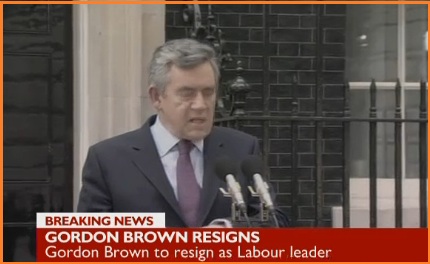David Herdson says that there’s never a good election to lose

May 11th 2010
Those who invite or accept defeat for some greater end are usually deluded and counter-productive
One pre-election tradition that has been little honoured so far is hearing the assertion it will be a ‘good one to lose’. Invariably, those who put that argument forward fall into one or both of two overlapping groups: those who spy monsters down the road which they believe will slay the election winners, providing the opportunity for their preferred party to win a string of victories starting the time after; and those who advocate policies which differ from their party leadership’s and which they wish to see rejected. What both groups have in common is that they are essentially political losers: they are people looking for consolation in defeat they have already mentally accepted.
That sort of game-playing is fraught with risk. In particular, those who engage in it consistently overestimate the potency of the monsters and understate the boost the governing party (or faction within a party), will gain if they end up victorious. They also tend to underestimate the extent to which a party out of power can indulge in in-fighting, even though their thinking anticipates precisely that kind of intra-party struggle. (Of course, governing parties can be beset by splits and factionalism too but the very business of governing tends to mitigate them: out of office, the factions can give full vent to their spleen).
I recall voices within the Tory Party saying that 1997 would be a good election to lose because Blair wasn’t threatening ideologically and that the party could refresh itself in opposition. In the event, the party that returned to government was probably very different from what they’d envisaged, and the state of the country altered even more dramatically.
Similar arguments could have been put in advance of the 1974, 1979, 1983, 1992 and 2010 elections (and in retrospect, the 2005 one too): all brought big challenges, the responses to which would inevitably bring a degree of unpopularity. Yet it’s not just the government which is measured against those challenges; alternative governments – within and without the governing party/ies – are too.
Perhaps the biggest failure in courting the opposition benches is the ceding of initiative. Governments cannot always dominate the political narrative but they enjoy a good deal more opportunity to do so than oppositions. They can also, by their nature, do things which have a lasting impact and which those out of power might passionately (but futilely) oppose, some of which will be structural changes, perhaps irreversible.
That’s not to say some groups don’t benefit from opposition. Would the Thatcherites have dominated the 1980s and beyond had Heath not lost in 1974? Probably not, but then had Heath won his snap election, he could have faced down the miners, capped rather than exacerbated the inflationary boom already underway, avoided the IMF being called in, the cuts that followed and the Winter of Discontent. In the meantime, Labour in opposition could have easily fallen into the pro-/anti-Bennite strife that they did, except five years earlier. Who knows, buoyed by victory, the pre-1972, ‘Selsdon’, proto-Thatcherite Heath might even have re-emerged (or probably not, but the point is that Heath’s defeat was not an absolutely necessary step towards the Thatcherite ascendency, first within the Conservatives and later the country at large).
On the other hand, there was certainly no guarantee that’d they benefit from opposition. After all, Thatcher largely became leader by accident, in part because no bigger name stood in the first round of the leadership election, and in part because many of her first round votes were anti-Heath as a person, not pro-Thatcher as a policy platform. Even if some right-wing Tories had believed the 1974 elections to be good ones to lose, it was only a great amount of good luck that enabled the opportunities they perceived to become reality. Theirs was very much the exception.
And 2015? Yes, there are undoubtedly difficult challenges beyond that date but then when aren’t there? The assumptions behind ‘a good election to lose’ are that there’ll be a better one to win later, that the cost of not winning now will be worth it, and that it will be possible to win at the ‘right’ time. They’re stupid arguments. If the government does make a hash of it (as in 1974), you end up having to pick up the pieces in a far worse position; if they don’t (as in 1997), they get re-elected and are able to integrate their ideology ever more into the economy and society. People who want to lose deserve to get what they ask for.
